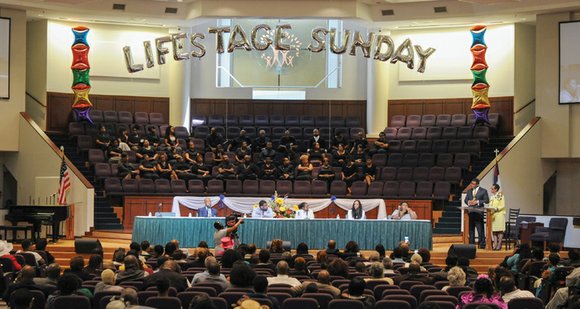National funeral directors group seeks end to youth violence
8/5/2016, 7:35 a.m.

By Leah Hobbs
Hall Davis, a funeral director from Baton Rouge, La., described burying a young man who was killed during an attempted robbery of a drug dealer.
The young man’s mother brought in a T-shirt in which to bury her son. It read: “Is there a heaven for a gangster?” Those words are lyrics from a Tupac Shakur song.
Mr. Davis said he encounters many bodies with “thug life” tattoos, a phrase that also evolved from the late Tupac. Death by street life has become a part of the culture.
And while burying the dead is the livelihood of funeral directors, they don’t want to bury young people.
That’s the message that was driven home by the National Funeral Directors & Morticians Association during a “Stop the Violence” rally last Sunday at Saint Paul’s Baptist Church in Henrico’s East End.
The rally, which drew about 200 people, was among several events during the 1,200-member association’s recent 79th annual convention in Richmond.
Conference organizers said they have seen far too many young people die because of violence.
“We’ve had enough,” said Carol T. Williams, executive director of the association. “We’ve had enough of watching families come into our funeral homes to deal with violent death. We have to bring attention and find a solution to this epidemic. Enough is enough.”
Speakers and panelists offered solutions for ending the tragedies.
The solution starts at home, according to some attendees. Svondai Brown, who lost a teenage godson to gun violence, and Christina Gill, an Atlanta attorney, encouraged parents to take active leadership roles in their households.
“Be the influence for your children, instead of other young people influencing them,” Ms. Brown said. “Teach the children the difference between what’s right and what’s wrong.”
Ms. Gill added, “Have open communication with them so that children will not be afraid to come to their parents when they’re in trouble.”
Other attendees said that finding solutions starts in the communities, with community members uniting and becoming involved in programs for young people.
“Richmond needs a middle school football program,” said Maurice Tyler, founding director of Coaches Against Violence Everywhere, a program dedicated to helping youths through the influence of coaches. “Young people in Richmond are not interested in soccer and horticulture. Their heroes are the likes of NFL quarterback Cam Newton. Give them a program that meets their interests. Give them something that will help them focus.”
The solution also starts with government, attendees were told. Police are not given enough resources to deal with poverty-stricken neighborhoods. Virginia Sen. A. Donald McEachin of Henrico County said improved employment is key.
“The best crime bill we can possibly pass is a jobs bill,” he said. “When people have jobs, they have hope, and crime goes down.”
Sen. McEachin also said a good education at an early age is important and helps to instill goals of attending college.
Petersburg Sheriff Vanessa R. Crawford stressed that real change can be accomplished with a simple change in attitude.
“We each need to do our part to change our behavior,” she said. “If we want to see a change, it has to start with us by showing more compassion and being willing to compromise.”
The funeral director’s association, the oldest organization of African-American funeral directors and embalmers in the nation, believes it is doing its part by bringing awareness of the relationship between violence and death.
Connie B. Steele of the family-owned Serenity Funeral Home and Cremation Service in Roanoke, who handles publicity for the association, explained that many funeral directors hope that young people will see the reality of death and change their behavior.
She described a mother who brought her child to a friend’s funeral. “She wanted her child to see this is real. Once someone dies, they’re not coming back. Death is final,” said Mrs. Steele.
“Young people do show up” for funerals, she continued. “They cry and make remarks, but it doesn’t seem to really hit home. The finality of death isn’t really registering.”
Richmond Police Chief Alfred Durham expressed similar sentiments.
“You see the end result of what violence can do,” he told the funeral directors. “You see the destruction of families. You see the destruction of life. We hold vigils, wear T-shirts and pour out bottles, but we’ve been desensitized by death in our own communities.”
Chief Durham expressed outrage at the recent deaths of Alton Sterling in Baton Rouge, La., and Philando Castile in Falcon Heights, Minn. But he also expressed his outrage at last December’s shooting death of 12-year-old Amiya Moses right here in Richmond. Violence in the black community needs as much attention as police brutality and racism, he said.
“Black lives need to matter in our own communities everday,” Chief Durham said.
Mrs. Williams agreed, saying, “What we are is not greater than what we can become. We will make a difference.”







